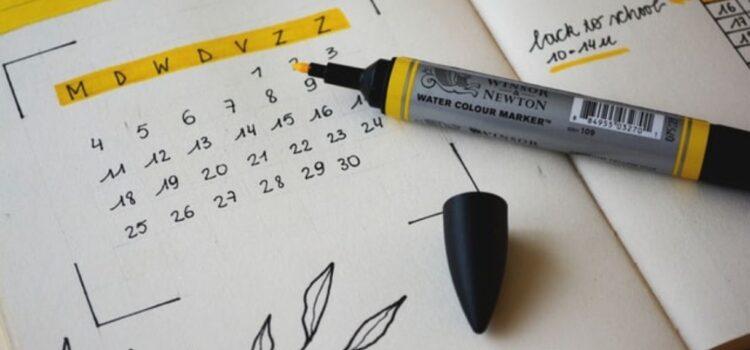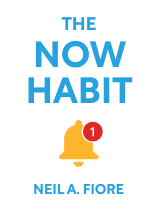

This article is an excerpt from the Shortform book guide to "The Now Habit" by Neil A. Fiore. Shortform has the world's best summaries and analyses of books you should be reading.
Like this article? Sign up for a free trial here.
Do you plan your week in advance, or do you prefer to go with the flow? What’s the best way to schedule your week?
When planning ahead, most people prioritize work, not play. If you want to make the most of your week, you should reverse this approach and plan your week around your leisure time, not your work.
Here’s how to schedule your week for maximum happiness.
Plan Play, Not Work
Fiore’s fundamental planning idea is that you should plan your week around your leisure time, not your work. He recommends that you start by writing down specific appointments as well as necessary activities like eating and sleeping. Next, add scheduled leisure time—which can include play, socializing, hobbies, self-care (for example, exercise or meditation), and so on.
Fiore recommends scheduling at least half an hour of recreation or relaxation per day. He also recommends dedicating one day entirely to play—in other words, one day completely free of work (though he says it’s okay to tackle a few small chores that you didn’t have time for elsewhere).
Fiore says that following these guidelines forces you to see how little time you actually have for work in a given week—which in turn motivates you to make the most of what time you do have. He says that this approach also guarantees that you take time to play and that you don’t feel guilty for doing so. The idea is to reduce your resistance to work by making it seem less overwhelming.
| How to Schedule Your Week: An Alternative Approach If Fiore’s emphasis on fun and recreation doesn’t speak to you, you might consider the scheduling recommendations Nir Eyal lays out in his book Indistractable. Like Fiore, Eyal suggests balancing your work and non-work time, but he emphasizes values rather than fun. Here are Eyal’s guidelines: 1) Start by scheduling activities that line up with your personal values. For instance, if you value being active, things like workouts and hikes should go into your schedule first along with necessities like eating, sleeping, bathing, and so on. 2) Next, schedule regular, non-negotiable time with family and friends. Eyal explains that it’s easy to neglect your loved ones and friends and that the best way to avoid that is to set aside regular time to spend with them. 3) Finally, when scheduling your work, allot your time to activities that support your goals. For example, if you’re seeking a promotion, he suggests communicating with your boss to make sure you spend your time on work that moves both you and your company forward (rather than busywork that doesn’t). Note that Fiore’s and Eyal’s approaches differ mostly in their emphases. Like Eyal, Fiore recommends scheduling time for self-care and socialization, but he classifies these as types of leisure time, whereas Eyal makes them the fundamental focus of his method (raising them above other types of leisure like fun or hobbies). That’s because Fiore’s underlying goal is to get you to prioritize the things you enjoy, whereas Eyal wants you to think about what’s most important to you. Both writers want you to place your work in the larger context of a balanced and fulfilling life—they just have different ways of getting there. |
Don’t Schedule Your Work—Track It
You probably noticed that Fiore’s scheduling guidelines mention necessities, appointments, and play, but say nothing about work. That’s because Fiore advises against scheduling work in advance. Instead, he recommends that throughout the week, you record work as you do it, and only if you follow these rules:
1) Only record blocks of work after you’ve done at least half an hour of uninterrupted quality work on a project. This rule has two goals: 1) To break your work into manageable chunks so you don’t get overwhelmed, and 2) to encourage you to stick with a project even when it’s challenging.
2) Take a break after each block of work. Either rest or move to a more enjoyable task. The idea is to reward yourself for starting and sticking with something hard and to recharge your motivation and creativity.
3) Total up your hours of quality work each day and for the whole week, and celebrate your accomplishments. Fiore says that simply keeping this record is rewarding and that you’ll feel motivated to do more work as you watch your tally of hours accumulate.
(Shortform note: Potential downsides to not planning your work: You might spend longer on a task than you meant to, and you might have a hard time balancing competing responsibilities. To avoid these problems, Nir Eyal also suggests organizing your work into blocks called timeboxes, but unlike Fiore, he recommends entering your timeboxes into your calendar in advance. Doing so allows you to strategize your time and balance your work. In fact, Eyal recommends timeboxing all of your activities (not just work), arguing that explicitly scheduling all of your time is the only way to accurately judge whether you’re actually sticking to your plan or getting distracted.)

———End of Preview———
Like what you just read? Read the rest of the world's best book summary and analysis of Neil A. Fiore's "The Now Habit" at Shortform.
Here's what you'll find in our full The Now Habit summary:
- Why people tend to put off the things that matter the most
- Where procrastination stems from, and why it doesn't mean you're lazy
- How to get more done while still maintaining a balanced life






